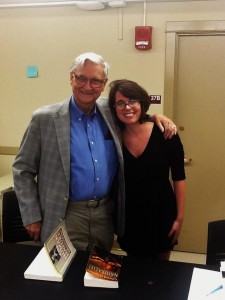From almost my first post I promised to let the students speak for themselves when it came to singing the praises of our EvoS program at the University of Alabama. One of our first UA EvoS alumni is Emily Freeman, who graduated our program in May 2012. I asked her to write this piece after she told me how transformative & eye-opening the “Evolution for Everyone” course was for her, which almost came too late, as she was close to graduating when she took it.
By Emily Freeman
 I stumbled into the Evolutionary Studies program without a clear vision of what to expect and having had no formal education on the tenets that comprise evolution. Soon after my initial exposure to the introductory course, I began to feel as if I had been cheated not only in my education of evolution, but my entire education in the physical sciences. It is no secret that evolutionary theory has been the victim of much scrutiny and has in many cases been muddled, made out to be scientific rhetoric, or eradicated completely from science curriculums across the United States. What the UA Evolutionary Studies minor offers is a chance to make up for the education and opportunities that have been limited by many public education institutions in the state of Alabama and elsewhere, and to widen one’s understanding of how evolution is part of everyday events and interactions.
I stumbled into the Evolutionary Studies program without a clear vision of what to expect and having had no formal education on the tenets that comprise evolution. Soon after my initial exposure to the introductory course, I began to feel as if I had been cheated not only in my education of evolution, but my entire education in the physical sciences. It is no secret that evolutionary theory has been the victim of much scrutiny and has in many cases been muddled, made out to be scientific rhetoric, or eradicated completely from science curriculums across the United States. What the UA Evolutionary Studies minor offers is a chance to make up for the education and opportunities that have been limited by many public education institutions in the state of Alabama and elsewhere, and to widen one’s understanding of how evolution is part of everyday events and interactions.
Many would perceive that having a formal education in evolutionary theory would be reserved only for those who are interested in pursuing a career in a scientific discipline, but being well versed in evolutionary theory is critical to understanding the human condition and the ways in which interactions with our environment shape our daily lives. With this knowledge at hand, we can begin to better interpret how and why evolution is acting on particular variables that affect the world in which we are all a part. These areas include a deeper understanding of such things as culture, relationships, religion, warfare, politics, current events, poverty, economics, and social stratification. These extensions of the human condition are but a few examples of the criterion which the Evolutionary Studies minor attempts to address and reconcile under the umbrella of evolutionary theory. Before my introduction to evolutionary theory, I would not have imagined that the ideas inspired by having a greater understanding of evolution could be utilized when pursuing disciplines such as engineering, computer science, education, political science, business and finance, psychology, philosophy, history, sociology, and linguistics.
By better understanding evolution’s role in nature, it allows us to deduce particular aspects of how humans interact with each other and our environment, and affords us the tools to assess not only our own daily experiences, but those of other people around us and across the world. The minor uses an interdisciplinary approach which allows for a wide variety of exposure to the many areas of knowledge wherein evolutionary theory is used as a mechanism to infer questions about our world and nature. My experience in the program has been the instigating factor for my fascination with the natural world, and been solely responsible for my choice to pursue a career in science. In the tools of science and evolution, I have found a means to further my knowledge and critically evaluate myself, my environment, and my place in the broader understanding of life.

It turns out Ed Wilson’s mother was an Alabama Freeman & that Emily & Dr. Wilson are related! They reconnect after UA’s first ALLELE lecture this year.
The Evolutionary Studies minor ignited my interest in science and inquiry. After a few courses in biology and anthropology, I quickly recognized that a career in science was something I wanted for my future; and, if I could apply the appropriate amount of effort, interest, and commitment, I could accomplish just that. By immersing myself in evolution’s role in scientific thought I have acquired a strong sense of inquiry and introspection towards science, and this has led me to pursue human behavior and cognition. My ultimate scientific goal is to be a part of a researching community dedicated to understanding how we interpret our world and each other, and similarly how we respond to those interpretations.
I am particularly interested in the brain’s role in delineating this information and the subsequent behaviors that result. I hope to accomplish these goals through the study of neuroscience and psychology, and to one day pursue a doctoral degree in this area of research. My goals, excitement towards science and education, and my future career in science, will be traced back to my experience in UA’s Evolutionary Studies minor. The program exposed me to an in-depth understanding of evolution’s role in nature, and to that I will always accredit with the instigation of my pursuance of science, and the beginning of my lifelong love-affair with education, scientific investigation, and unrelenting inquiry.
Emily majored in Political Science at Alabama but shifted gears upon pursuing the UA EvoS minor. She is now studying behavioral neuroscience at the University of Alabama-Birmingham.
